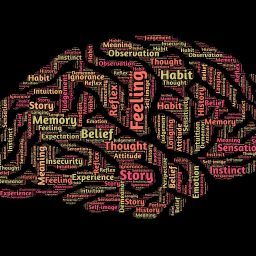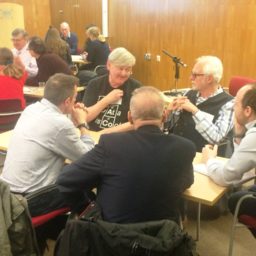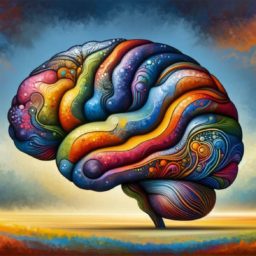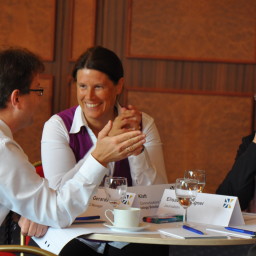
Imagine a culture where an argument is viewed as a dance, the participants are seen as performers, and the goal is to perform in a balanced and aesthetically pleasing way. In such a culture, people would view arguments differently, experience them differently, carry them out differently, and talk about them differently. But we would probably not … | George Lakoff and Mark Johnsen Continue reading Imagine a Culture Where an Argument Is Viewed as a Dance George Lakoff and Mark Johnsen

Productive disagreement depends on how people feel about each other. We spend a lot of time thinking about how to argue, and not enough on how to shape the relationship that will define how the engagement goes. It’s often said that in order to disagree well, people need to put emotions aside and think purely rationally, but this is a myth. … | Ian Leslie Continue reading Productive Disagreement Depends on How People Feel About Each Other Ian Leslie

In this book, The Argument Culture, Deborah Tannen examines how we communicate in public — in the media, politics, courtrooms, and classrooms — letting us see in a new way forces that have powerfully shaped our lives. The war on drugs, the battle of the sexes, political turf combat — in the argument culture, war … Continue reading The Argument Culture: Stopping America’s War of Words by Deborah Tannen (1999)

Our public interactions have become more and more like having an argument with a spouse. Conflict can’t be avoided in our public lives any more than we can avoid conflict with people we love. One of the great strengths of our society is that we can express these conflicts openly. But just as spouses have to learn ways of settling their differences … | Deborah Tannen Continue reading Public Discourse Is Like Having a Fight Deborah Tannen

Conversation is the vehicle for change. We test our ideas. We hear our own voice in a concert with another. And inside those pauses of listening, we approach new territories of thought. A good argument, call it a discussion, frees us. Words fly out of our mouths like threatened birds. Once released, they may never return. If they do, they have … | Terry Tempest Williams Continue reading Conversation Is the Vehicle for Change Terry Tempest Williams

Perhaps the essence of the Liberal outlook could be summed up in a new decalogue, not intended to replace the old one but only to supplement it. The Ten Commandments that, as a teacher, I should wish to promulgate, might be set forth as follows: Do not feel absolutely certain of anything. Do not think it worthwhile to produce belief by concealing … | Bertrand Russell Continue reading Bertrand Russell’s Ten Commandments for Critical Thinking Bertrand Russell

There is no conversation more boring than the one where everybody agrees. | Michel de Montaigne Continue reading Boring Conversation Michel de Montaigne

The Argumentative Theory of Human Reason | THUNK Reasoning was not designed to pursue the truth. Reasoning was designed by evolution to help us win arguments. Posts that link to this post What Are Cognitive Biases? Mistakes in reasoning, evaluating or rememberingTags: argument (33) | reasoning (53) | social reasoning (19)Google Web Search Photo Credits: Midjourney ()This … Continue reading The Argumentative Theory of Human Reason Reasoning was designed by evolution to help us win arguments

In a conversation the participants are not engaged in an inquiry or a debate; there is no ‘truth’ to be discovered, no proposition to be proved, no conclusion sought. They are not concerned to inform, to persuade, or to refute one another, and therefore the cogency of their utterances does not depend upon their all speaking in the same idiom; they may differ without disagreeing. Of course, a … | Michael Oakeshott Continue reading In a Conversation the Participants Are Not Engaged in an Inquiry Michael Oakeshott

Abstract Reasoning is generally seen as a means to improve knowledge and make better decisions. However, much evidence shows that reasoning often leads to epistemic distortions and poor decisions. This suggests that the function of reasoning should be rethought. Our hypothesis is that the function of reasoning is argumentative. It is to devise and evaluate … Continue reading Why Do Humans Reason? Arguments for an Argumentative Theory Hugo Mercier and Dan Sperber (2010)

The best argument against Democracy is a five-minute conversation with the average voter. | Winston Churchill Continue reading The Best Argument Against Democracy Misattributed to Winston Churchill

No truth is without some mixture of error, and no error so false but that it possesses no element of truth. If a man is in too big a hurry to give up an error, he is liable to give up some truth with it, and in accepting the arguments of the other man he is sure to get some errors with it. Honest argument is merely a process of mutually picking … | Wilbur Wright Continue reading No Truth Is Without Some Mixture of Error by Wilbur Wright

We don’t have a good word for engaging in a non-hostile disagreement with the shared aim of moving the participants towards a new understanding, better decision or new idea. Debate implies a competition with winners and losers. Argument comes tinged with animosity. Dialogue is too bland. Dialectic is too obscure. We talk about argument as if it is … | Ian Leslie Continue reading We Don’t Have a Good Word for Engaging in a Non-hostile Disagreement Ian Leslie

What Is a Real Conversation? The Value of Conversation ** Close Pop-up all posts in this chapter What’s the Vibe? Please be patient as this may take up to a minute to load… Close Numerous words or phrases describe the varied forms of conversation and speech. This page lists some of the more common ones … Continue reading The Language of Conversation and Speech Meanings of words describing conversation and speech

Analyze Assumptions and Biases Practice Analogical Thinking Close Pop-up all posts in this chapter What’s the Vibe? Please be patient as this may take up to a minute to load… Close Play Devil’s Advocate: Ask the chatbot to provide counterarguments or alternative perspectives to a particular stance. We can develop a more comprehensive understanding by … Continue reading Play Devil’s Advocate Ask the chatbot to provide counterarguments or alternative perspectives to a particular stance

Summarize Conflicting Perspectives Explore Hypothetical Scenarios Close Pop-up all posts in this chapter What’s the Vibe? Please be patient as this may take up to a minute to load… Close Deconstructing Arguments: Present an argument to the chatbot and ask it to break the argument down into its constituent premises and conclusion. This aids in … Continue reading Deconstructing Arguments Use the chatbot to deconstruct arguments

Open Mindedness ** Active Listening ** Close Pop-up all posts in this chapter What’s the Vibe? Please be patient as this may take up to a minute to load… Close Critical thinking objectively analyzes, evaluates, and synthesizes information to form a reasoned judgment or decision. It involves using logic and reasoning to examine assumptions, arguments, … Continue reading Critical Thinking ** Analyzing information and arguments to make sound judgments and decisions

Conversation Is More Than Communication The Jazz of Conversations Close Pop-up all posts in this chapter What’s the Vibe? Please be patient as this may take up to a minute to load… Close We often say we need to debate something – especially in the political world – when what we really need is a … Continue reading The Difference Between Dialogue and Debate ** In dialogue, finding common ground is the goal while in debate, winning is the goal

Circles of Engagement ** What Would Make a Better World? Close Pop-up all posts in this chapter What’s the Vibe? Please be patient as this may take up to a minute to load… Close The term “signal-to-noise ratio” is a useful metaphor when discussing the pollution of the information ecosystem with misinformation, disinformation, or situations … Continue reading Signal-to-noise Ratio The ratio of useful or true information to false or irrelevant data

Knowledge and Information ** The Knowledge Delusion Close Pop-up all posts in this chapter What’s the Vibe? Please be patient as this may take up to a minute to load… Close The argumentative theory of reasoning proposes that reason did not evolve to help us to reason individually but to reason together – in other … Continue reading The Argumentative Theory of Human Reason We did not evolve to reason individually but to reason socially


Knowledge Café Principle: Engage in Small Groups Introduction: Knowledge Café Principles Close Pop-up all posts in this chapter What’s the Vibe? Please be patient as this may take up to a minute to load… Close Principle: Dialogue, not debate. Knowledge Café conversations are about making sense of a situation, sharing information, better understanding each other, … Continue reading Knowledge Café Principle: Dialogue Not Debate Be prepared to emerge a slightly different person

Conversare Events The Dérive Close Pop-up all posts in this chapter What’s the Vibe? Please be patient as this may take up to a minute to load… Close Debates are an essential part of communication, allowing for the exchange of differing viewpoints. However, understanding their various forms and purposes can be challenging. By exploring the … Continue reading Understanding Debates Argument is meant to reveal the truth, not to create it

The Dérive Dialogic Organization Development Close Pop-up all posts in this chapter What’s the Vibe? Please be patient as this may take up to a minute to load… Close The meaning of dialogue The word dialogue has several meanings depending on the context in which it is used. If you look up the word in … Continue reading Dialogue Dialogue is a disciplined form of conversation

The Power of Team Huddles Ongoing Performance Conversations Close Pop-up all posts in this chapter What’s the Vibe? Please be patient as this may take up to a minute to load… Close The Oracy Lab is an experimental space for exploring the power and possibilities of conversations and spoken communication for conveying meaning and co-creating … Continue reading The Oracy Lab An experimental space for exploring the power and possibilities of conversations

Speak with Less Conviction Reduce Emailing and Texting ** Close Pop-up all posts in this chapter What’s the Vibe? Please be patient as this may take up to a minute to load… Close Disagree constructively: Disagreement is an inevitable part of life. Most of the time, we do it poorly. We need to learn to … Continue reading Disagree Constructively How to disagree well

Become a Conversation Architect Rediscovering Rhetoric Close Pop-up all posts in this chapter What’s the Vibe? Please be patient as this may take up to a minute to load… Close In education, considerable emphasis is placed on numeracy and literacy — understanding and working with numbers and reading and writing. But what about the capacity … Continue reading Oracy The ability to express oneself in and understand spoken language

Oracy What Is the Difference Between Rhetoric and Oracy? Close Pop-up all posts in this chapter What’s the Vibe? Please be patient as this may take up to a minute to load… Close Rhetoric is often construed as insincere or meaningless language that sounds clever. This is an unduly negative perspective. Rhetoric is a critical … Continue reading Rediscovering Rhetoric Rethinking how we influence and communicate every day

Rediscovering Rhetoric Introduction: the Power of Conversation Close Pop-up all posts in this chapter What’s the Vibe? Please be patient as this may take up to a minute to load… Close On the face of it, rhetoric and oracy would seem the same, but although they have much in common, they have some significant differences. … Continue reading What Is the Difference Between Rhetoric and Oracy? Rhetoric is monologue, oracy is dialogue



















